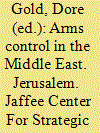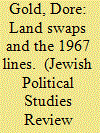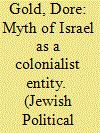| Srl | Item |
| 1 |
ID:
004877


|
|
|
|
|
| Publication |
Jerusalem, Jaffee Center for Strategic Studies, 1990.
|
| Description |
160p.;maps
|
| Series |
JCSS Study;15
|
| Standard Number |
9653560174
|
|
|
|
|
|
|
|
|
|
|
|
Copies: C:1/I:0,R:0,Q:0
Circulation
| Accession# | Call# | Current Location | Status | Policy | Location |
| 035887 | 327.1740956/GOL 035887 | Main | On Shelf | General | |
|
|
|
|
| 2 |
ID:
005706


|
|
|
|
|
| Publication |
Tel Aviv University, Jaffe Centre for Strategic Studies, 1995.
|
| Description |
55p.; maps and sources
|
| Series |
Final Status issues, Israel Palestinian, study; no.7
|
| Standard Number |
9654590212
|
|
|
|
|
|
|
|
|
|
|
|
Copies: C:1/I:0,R:0,Q:0
Circulation
| Accession# | Call# | Current Location | Status | Policy | Location |
| 037153 | 341.309569442/GOL 037153 | Main | On Shelf | General | |
|
|
|
|
| 3 |
ID:
127338


|
|
|
|
|
| Publication |
2014.
|
| Summary/Abstract |
When President Barak Obama made his first public reference to the 1967 lines as the basis for future Israeli-Palestinian negotiations on May 19, 2011, he introduced one main caveat: the idea that there would be "mutually agreed swaps" of land between the two sides. He added that both sides were entitled to "secure and recognized borders." But the inclusion of land swaps also raised many questions.
Where did the idea of land swaps come from? True, they have been part of the Israeli discourse among peace process experts for years, but were they legally required? To what extent do land swaps protect Israel's rights to "secure borders" in the event the 1967 lines are used as the territorial basis of a peace settlement?
Several months after Israel captured the West Bank and Gaza in the 1967 Six Day War, the U.N. Security Council defined the territorial terms of a future peace settlement in Resolution 242, which over the decades became the cornerstone for all Arab-Israeli diplomacy. At the time, the Soviets had tried to brand Israel as the aggressor in the war and force on it a full withdrawal, but Resolution 242 made clear that Israel was not expected to withdraw from all the territories that came into its possession, meaning that Israel was not required to withdraw from 100 percent of the West Bank.
|
|
|
|
|
|
|
|
|
|
|
|
|
|
|
|
| 4 |
ID:
124367


|
|
|
|
|
| Publication |
2011.
|
| Summary/Abstract |
While modern Israel was born in the aftermath of the British Mandate for Palestine, which called for a Jewish national home, its roots preceded the arrival of the British to the Middle East. In that sense Britain was not Israel's mother-country, like France was for Algeria. Indeed, the Jews were already reestablishing their presence independently in their land well before the British and French dismantled the Ottoman Empire. As time went on, it became clear that the British Empire was not the handmaiden of Israel's re-birth, but rather its main obstacle. The accusation that Israel has colonialist roots because of its connection to the British Mandate is ironic, since most of the Arab states owe their origins to the entry and domination of the European powers.
|
|
|
|
|
|
|
|
|
|
|
|
|
|
|
|